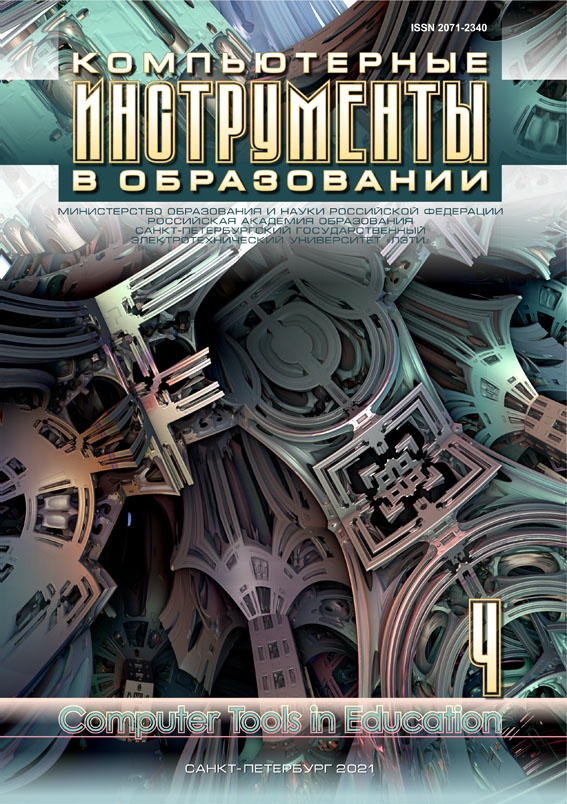Conceptual model of a system for automating recommendations regarding the organization of a system for conducting distance learning
Abstract
This paper presents a conceptual model of a system that allows automating the offer of
recommendations regarding the methods of conducting distance learning. The initial datafor the system are links to students’ accounts in popular Russian-language social networks. The system downloads the available information from the provided links, analyzes the extracted data and, in accordance with the results of the analysis, gives recommendations for conducting classes in an online (remote) format. The general goal of the research direction is the transition to modern systems of digitalization of the educational process.
The purpose of this article is to build a conceptual model of a system for automating recommendations regarding ways to conduct distance learning with students. The theoretical significance of the work lies in the development of a new conceptual model, which will form the basis for further construction of methods, models, algorithms and implementation of the system. The results obtained can be used to develop practical systems for improving the quality of education and in the framework of research in the field of didactics.
References
I. R. Gafurov, G. I. Ibragimov, A. M. Kalimullin, and Т. B. Alishev, “Transformation of Higher Education During the Pandemic: Pain Points,” Higher Education in Russia, vol. 29, no. 10, pp. 101–112, 2020 (in Russian); doi: 10.31992/0869-3617-2020-29-10-101-112
“Policy Brief: Education during COVID-19 and beyond,” in www.un.org. [Online]. Available: https://www.un.org/development/desa/dspd/wp-content/uploads/sites/22/2020/08/sg_policy_brief_covid-19_and_education_august_2020.pdf
V. K. Dyachenko, Novaya didaktika [New didactics], Moscow: Public education, 2000 (in Russian).
A. C. E. S. Lima and L. N. de Castro, “A multi-label, semi-supervised classification approach applied to personality prediction in social media,” Neural Networks, vol. 58, pp. 122–130, 2014; doi: 10.1016/j.neunet.2014.05.020
Т. V. Tulupyeva, А. S. Tafinceva, and А. L. Tulupyev, “An approach to personality analysis in digital footprints,” Vestnik psihoterapii, vol. 60, no. 65, pp. 124–137, 2016 (in Russian).
Т. V. Tulupyeva, A. V. Suvorova, А. А. Azarov, А. L. Tulupyev, and N. V. Bordovskaya, “Сomputer tools in the analysis of students’ digital footprints in social network: possibilities and primary results,” Сomputer tools in Education, no. 5, pp. 3–13, 2015 (in Russian).
D. Xue, Z. Hong, S. Guo, L. Gao, L. Wu, J. Zheng, and N. Zhao, “Personality recognition on social media with label distribution learning,” IEEE Access, vol. 5, no. 7956172, pp. 13478–13488, 2017; doi: 10.1109/ACCESS.2017.2719018
М. А. Stankevich, N. А. Ignatiev, I. V. Smirnov, and N. V. Kiselnikova, “Personality traits prediction from vkontakte social media,” Voprosy kiberbezopasnosti, vol. 4, no. 32, pp. 80–87, 2019 (in Russian); doi: 10.21681/2311-3456-2019-4-80-87
Y. Kim and J.H. Kim, “Using computer vision techniques on Instagram to link users’ personalities and genders to the features of their photos: An exploratory study,” Information Processing and Management, vol. 54, no. 6, pp. 1101–1114, 2018; doi: 10.1016/j.ipm.2018.07.005
F. V. Bushmelov, М. V. Abramov, and Т. V. Tulupyeva, “Adaptive Method of Color Selection in Application to Social Media Images,” CEUR Workshop Proceedingsthis, no. 2782, pp. 252-–257, 2020.
J. H. Kim and Y. Kim, “Instagram user characteristics and the color of their photos: Colorfulness, color diversity, and color harmony,” Information Processing and Management, vol. 56, no. 4, pp. 1494–1505, 2019; doi: 10.1016/j.ipm.2018.10.018
I. Anderson, S. Gil, C. Gibson, S. Wolf, W. Shapiro, O. Semerci, and D. Greenberg, “"Just the Way You Are": Linking Music Listening on Spotify and Personality,” Social Psychological and Personality Science, vol. 12, no. 4, pp. 561–572, 2020; doi: 10.1177/1948550620923228
K. S. Meng and L. Leung, Factors influencing TikTok engagement behaviors in China: An examination of gratifications sought, narcissism, and the Big Five personality traits. Telecommunications Policy, 2021, no. 45 (7), 102172. doi: 10.1016/j.telpol.2021.102172
K. G. Erdineeva and V. S. Chernyavskaya, “Prediktory rezul’tativnosti obrazovaniya studentov v kontekste samoraskrytiya ih sposobnostej” [Predictors of student education performance in the context of self-disclosure of their abilities], Scientific Review. Series 2: Humanities, no. 6, pp. 78–90, 2017; doi: 10.26653/2076-4685-2017-6-08 (in Russian)
I. A. Novikova and A. A. Vorobyeyva, “Big five factors and academic achievement in russian students,” Psychology in Russia: State of the Art, vol. 10, no. 4, pp. 93–106, 2017; doi: 10.11621/pir.2017.0409
F. Patterson, A. Knight, J. Dowell, S. Nicholson, F. Cousans, and J. Cleland, “How effective are selection methods in medical education? A systematic review,” Medical Education, no. 50, pp. 36–60, 2016; doi: 10.1111/medu.12817
E. Idrizi, S. Filiposka, and V. Trajkovik, “Analysis of Success Indicators in Online Learning,” International Review of Research in Open and Distance Learning, vol. 22, no. 2, pp. 205–223, 2021; doi: 10.19173/irrodl.v22i2.5243
S. Lavy, “Who benefits from group work in higher education? An attachment theory perspective,” Higher Education, vol. 73, no. 2, pp. 175–187, doi: 10.1007/s10734-016-0006-z
J. M. Amala, K. R. Lakshmana, and P. K. P. Hari, “Impact of learning style and personality traits on students in academics,” International Journal of Recent Technology and Engineering, no. 4, pp. 224–227, 2019.
G. Kvon, V. Vaks, and O. Pozdeeva, “Using the Likert scale in the study of students’ motivational factors,” Scientific-methodological electronic journal Koncept, no. 11, pp. 84–96, 2018; doi: 10.24411/2304-120X-2018-11086
K. S. Taber, “The Use of Cronbach’s Alpha When Developing and Reporting Research Instruments in Science Education,” Research in Science Education, vol. 48, no. 6, pp. 1273–1296, 2018; doi: 10.1007/s11165-016-9602-2
V. Musina, “Bayesian belief networks as probabilistic graphical model for medical risk assessment,” SPIIRAS Proceedings, vol. 1, no. 24, pp. 135–151, 2014; doi: 10.15622/sp.24.9
M. S. Frolova, A. A. Korepanova, and M. V. Abramov, “Assessing the Degree of the Social Media User’s Openness Using an Expert Model Based on the Bayesian Network,” in Proc. 2021 XXIV International Conference on Soft Computing and Measurements (SCM), 2021, pp. 52–55; doi: 10.1109/SCM52931.2021.9507111
A. L. Tulupyev, Algebraicheskie bajesovskie seti: logiko-veroyatnostnaya graficheskaya model’ baz fragmentov znanij s neopredelennost’yu [Algebraic Bayesian Networks: Logical-Probabilistic Graphical Model of Knowledge Fragment Bases with Uncertainty], 2009 (in Russian).
V. I. Donskoi and A. I. Bashta, Diskretnye modeli prinyatiya reshenij pri nepolnoj informacii [Discrete decision-making models with incomplete information], Sinferopol, Russia: Tavria, 1992 (in Russian).

This work is licensed under a Creative Commons Attribution 4.0 International License.







